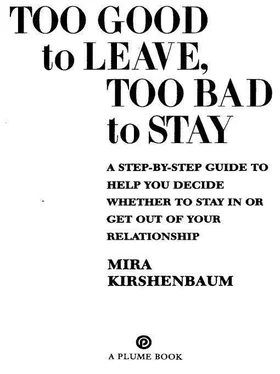Kirshenbaum, Mira - Too Good to Leave, Too Bad to Stay
Здесь есть возможность читать онлайн «Kirshenbaum, Mira - Too Good to Leave, Too Bad to Stay» весь текст электронной книги совершенно бесплатно (целиком полную версию без сокращений). В некоторых случаях можно слушать аудио, скачать через торрент в формате fb2 и присутствует краткое содержание. Жанр: Психология. Описание произведения, (предисловие) а так же отзывы посетителей доступны на портале библиотеки ЛибКат.
- Название:Too Good to Leave, Too Bad to Stay
- Автор:
- Жанр:
- Год:неизвестен
- ISBN:нет данных
- Рейтинг книги:3 / 5. Голосов: 1
-
Избранное:Добавить в избранное
- Отзывы:
-
Ваша оценка:
- 60
- 1
- 2
- 3
- 4
- 5
Too Good to Leave, Too Bad to Stay: краткое содержание, описание и аннотация
Предлагаем к чтению аннотацию, описание, краткое содержание или предисловие (зависит от того, что написал сам автор книги «Too Good to Leave, Too Bad to Stay»). Если вы не нашли необходимую информацию о книге — напишите в комментариях, мы постараемся отыскать её.
Too Good to Leave, Too Bad to Stay — читать онлайн бесплатно полную книгу (весь текст) целиком
Ниже представлен текст книги, разбитый по страницам. Система сохранения места последней прочитанной страницы, позволяет с удобством читать онлайн бесплатно книгу «Too Good to Leave, Too Bad to Stay», без необходимости каждый раз заново искать на чём Вы остановились. Поставьте закладку, и сможете в любой момент перейти на страницу, на которой закончили чтение.
Интервал:
Закладка:
I just want to assure you that as you see what’s right for you to do, you’ll be able to put love into perspective among all the other things you care about.
THE HAPPINESS THAT LIES AHEAD
My mission is to do two things.
First, it’s to share with you the experiences of people who’ve wrestled with the issues you’re wrestling with and come out on the other side and to report what they discovered. For example, think about something that bothers you about your partner, that strongly weighs on the side of your leaving. Wouldn’t you want to know how other people bothered by that felt once they left? You’ll find that out here. And if something else pointed to a basic strength in a relationship that made people happy they stayed, you’d want to know that, too. And you will. And if yet another issue you’ve been stewing over really turned out not to make too big a difference one way or the other, you’d want to know that as well so you could stop stewing over it. And you will.
Second, my mission is to help you rediscover the value of your own experience. I’m not going to pull a rabbit out of a hat that has nothing to do with what you’ve felt and seen about your partner and your relationship. Just the opposite. We’ll keep returning to the basics of your own experience. The problem isn’t that you don’t know what’s going on; it’s that you’ve had trouble sorting it all out.
The choice you discover will be one you feel good about after you make it, and better and better about as time goes by. It will be a choice that leaves you free of regret. Which is exactly what you were looking for in the first place!
TRAPPED IN LIMBO
If you’ve suspected that it’s not good for you to stay up in the air, you’re right. Staying ambivalent, in fact, can cause tremendous damage. Being stuck like this can end up killing you emotionally if you stay when you should be getting out. And it can end up killing your relationship if you keep thinking about leaving when it could be fixed if you only put energy into it. You can end up being deprived of joy and of freedom, of intimacy and of hope. And it’s not as if waiting around is going to show you what’s best for you. Ambivalence doesn’t produce real answers. It’s just a dangerous trap.
Doing the Limbo
Dee, a twenty-nine-year-old buyer, had lived with Keith for four years. There were good things about the relationship, like their strong sexual chemistry, but Dee was never really happy. They kept fighting about many things, like what Dee thought of as Keith’s irresponsibility, which she was afraid would only get worse in the future.
After they broke up last year, Dee was happier. But she was lonely. Now they’re dating each other again, partly because of her sexual needs, partly because she didn’t meet anyone better, and partly because Keith promised to grow up. And so their relationship chugs on, no better than it was before, filled with the same mixture of familiarity and misery it’s always had.
Dee’s not on the verge of making a commitment one way or the other. She’s on the verge of being stuck not knowing what to do with her relationship for a long time, possibly years.
Can you believe forty years? That’s how long another woman, Kate, spent neither being in her marriage nor leaving it but miserably camped on the outskirts of it, waiting for a sign to tell her what to do.
Kate’s Story
As you’ll see in a moment, Kate’s one of the most important women in my life; and the fact that she never broke through her ambivalence had an unhealthy impact on both of us. So it’s not only professionally but personally that I’ve experienced the terrible price we all pay for not knowing what to do with our relationships, all the pain and wasted time millions of people suffer from staying endlessly undecided.
Kate had married on the rebound after getting divorced following a brief first marriage. Her second husband, now dead, had been a businessman, volatile, quirky, sometimes unpleasant, but in some ways a decent guy. They were able to put up a good front, and their friends envied what from the outside seemed like one of the better marriages in their circle. But it was hard for Kate to remember when they’d ever had much in common. They usually couldn’t talk without fighting; when they weren’t fighting there was usually nothing to talk about.
It wasn’t the most terrible marriage in the world. There was just a lot of unhappiness in it flowing from distance and discord. On a scale of 1 to 10 (10 being best), Kate would’ve given it a 3. And yet she stayed in it, doing what she saw as her duty.
What do you think she should have done? Kate had two good alternatives. In spite of myths about women needing marriage, the evidence is now unmistakable that a woman like Kate could have been happy if she’d been on her own. And I believe she also could have had a chance at happiness if she’d stayed, working on the relationship more (perhaps going into couples therapy) instead of finding her energy sapped by thinking of leaving.
The Cost of Staying up in the Air. But Kate was terribly unhappy for forty years because she did neither. She waited for one milepost after another to pass—the kids starting school, her going back to work, the kids leaving home, her husband’s retiring—hoping that she’d get a sign that would tell her what to do.
Just think about what it must have been like to spend all those years thinking about leaving. It meant spending years stewing over all the things that were wrong with him and all the things that were wrong with her for staying with him. You pay a price for feasting on negativity like this. Suppose that it would have been best for Kate to leave. To live with all that negativity and not leave could only destroy your sense of yourself as a valuable, effective person. Or suppose that it would have been best for her to stay. Then living with all that negativity could only pollute and ultimately destroy what would otherwise be a viable marriage.
Kate paid another price for a lifetime of not deciding. The tension and misery she felt, directly traceable to living stuck in ambivalence, put a strain on her relationship with her children that took years to heal.
The woman I call “Kate” is my mother, with some details changed to protect her privacy (as I’ve done with all the people you’ll meet in this book), and her husband was my stepfather. In many ways, Kate’s a heroine, as a Holocaust survivor and a self-made businesswoman. But in this important way she didn’t know how to choose happiness. And in her ambivalence she’s like far too many of our parents, far too many people in middle age, and far too many people just starting out. I wrote this book to save others, to save you, from going through what my mother went through.
THE AMBIVALENCE EPIDEMIC
You may be wondering if there’s something wrong with you to feel so stuck. But the fact is that there’s an epidemic of ambivalence about many things these days. We live in an age that promotes self-awareness but fails to show us how to use our self-awareness to arrive at good decisions. We learn more and more things about ourselves without learning ways to sort them out or to sort out the feelings they generate in us.
This is particularly true when it comes to our relationships. As one actress said on TV, being interviewed about her marriage, “You’re supposed to reevaluate your relationship every day, aren’t you?” Only if you want to confuse and exhaust yourself. We’re told so many contradictory things: to be responsible to ourselves and to our partner, to be happy in ourselves and to be mature about our obligations, to fix our own lives above all else, and to fix our relationships no matter what.
Читать дальшеИнтервал:
Закладка:
Похожие книги на «Too Good to Leave, Too Bad to Stay»
Представляем Вашему вниманию похожие книги на «Too Good to Leave, Too Bad to Stay» списком для выбора. Мы отобрали схожую по названию и смыслу литературу в надежде предоставить читателям больше вариантов отыскать новые, интересные, ещё непрочитанные произведения.
Обсуждение, отзывы о книге «Too Good to Leave, Too Bad to Stay» и просто собственные мнения читателей. Оставьте ваши комментарии, напишите, что Вы думаете о произведении, его смысле или главных героях. Укажите что конкретно понравилось, а что нет, и почему Вы так считаете.












